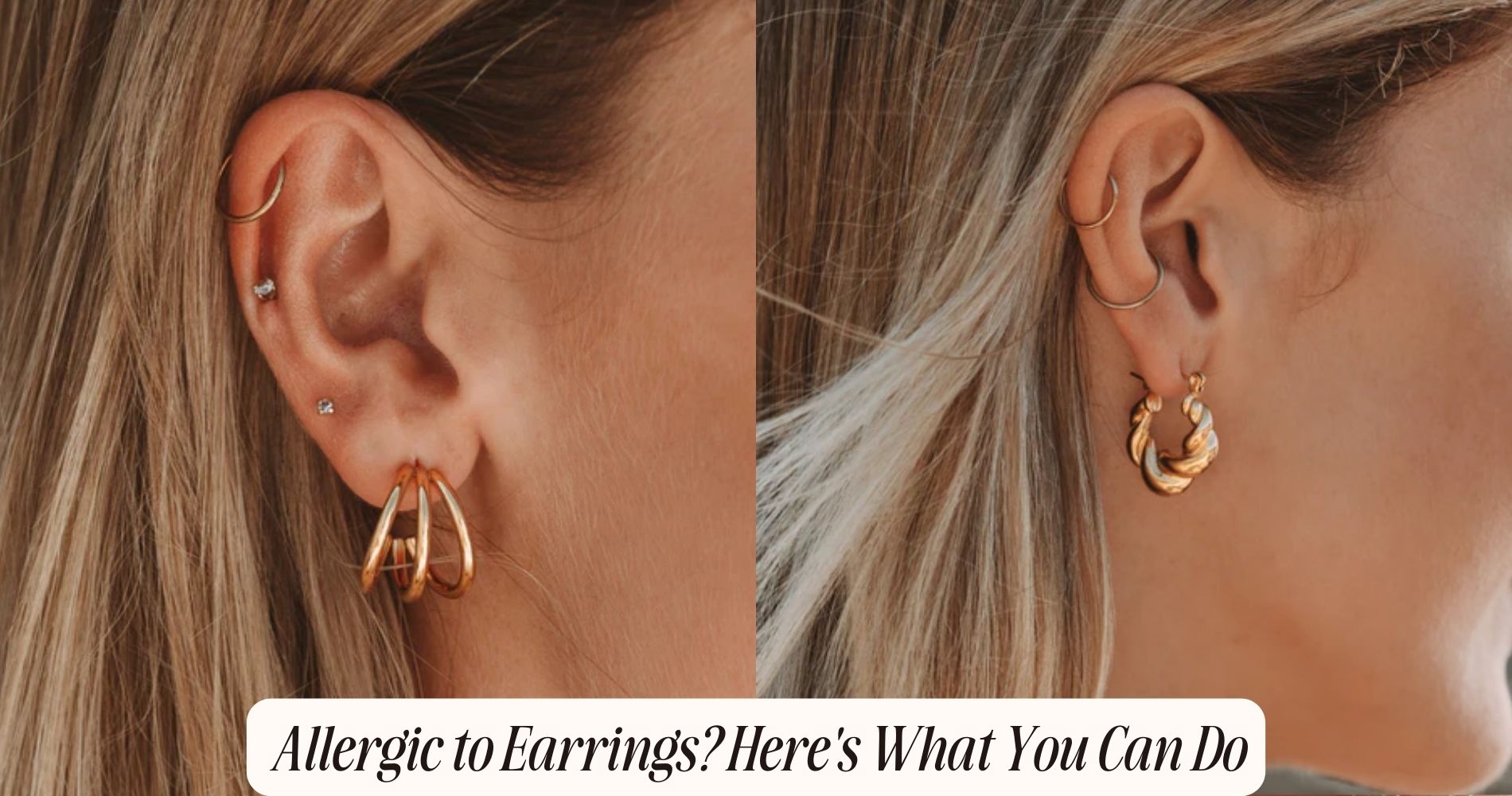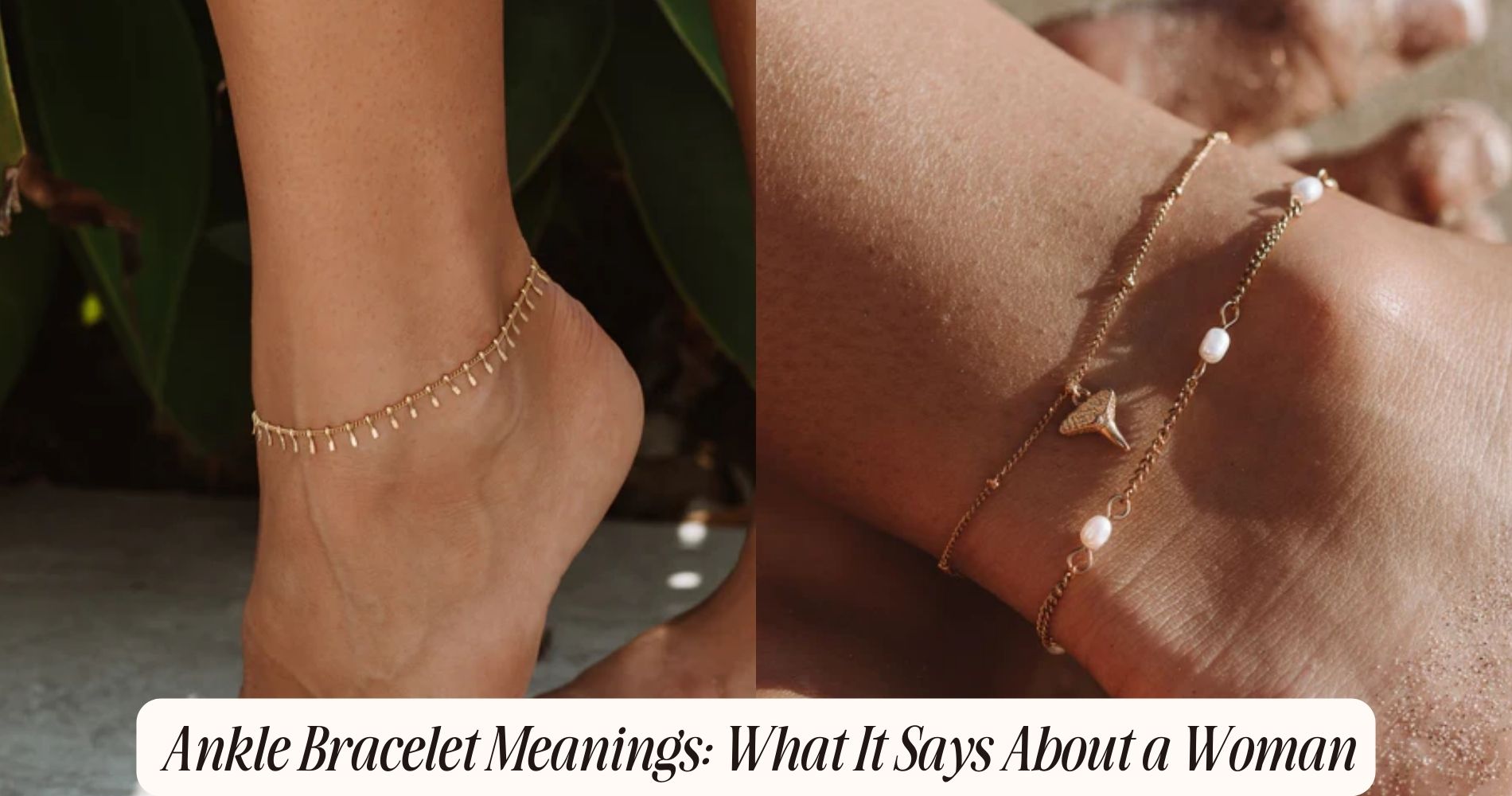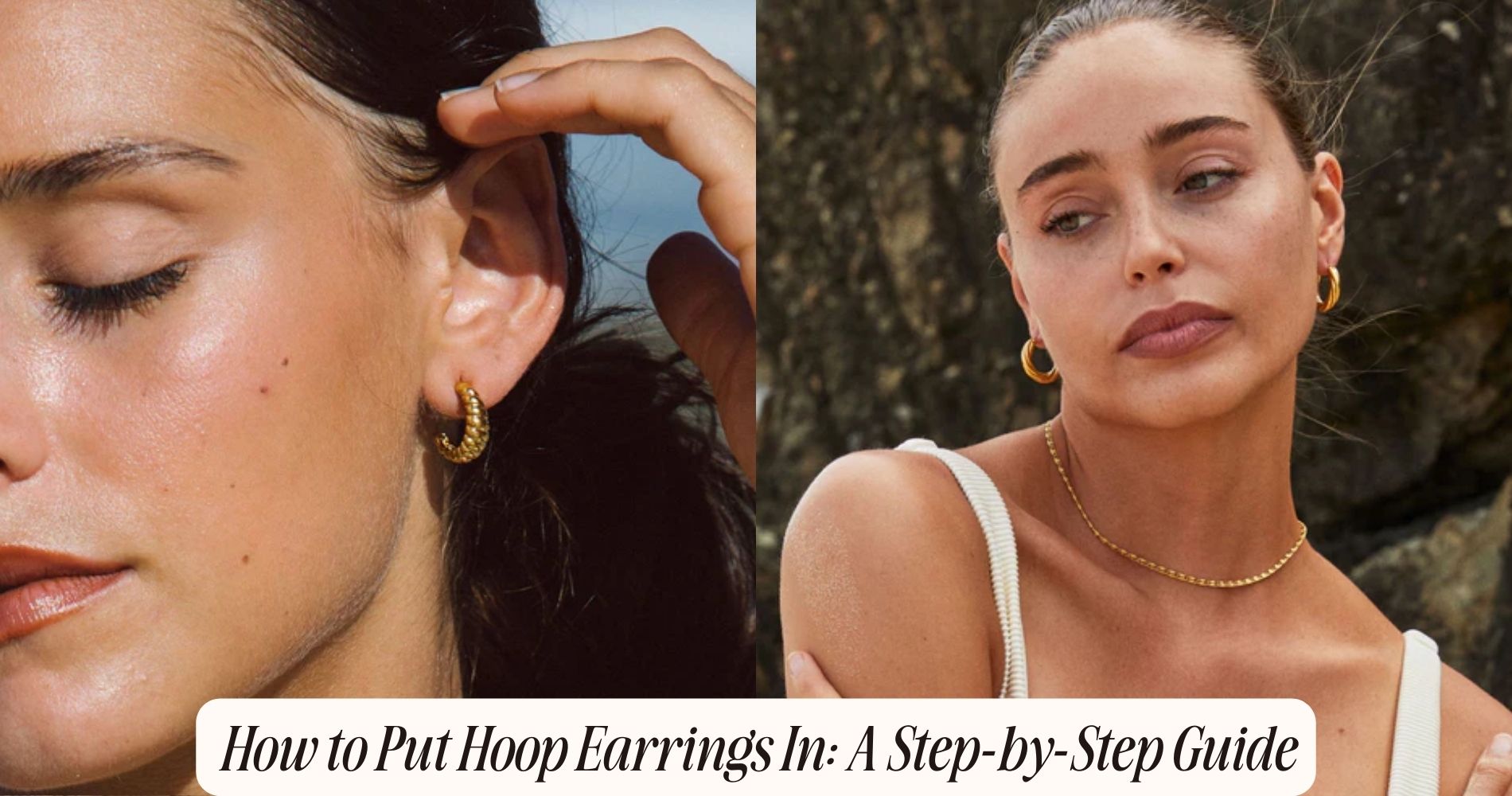
Allergic to Earrings? Here's What You Can Do
If your earrings are causing redness, itching, or irritation, you might have an allergy to certain metals or materials. Common triggers include nickel, cobalt, and copper. Opt for hypoallergenic options like titanium or surgical steel to prevent reactions. Keep your earlobes clean and dry, and consider using Vaseline before wearing earrings. If the discomfort persists, seeking advice from ear piercers or dermatologists can provide tailored solutions. For earrings that combine hypoallergenic properties with stylish durability, explore our Waterproof Earrings collection. Discovering what works best for your sensitive ears can make a significant difference in your earring-wearing experience.
Understanding Earring Allergies
If you've noticed redness, itching, or irritation after wearing earrings, you may be experiencing an earring allergy. This reaction is commonly caused by skin sensitivity to certain metals or materials found in earrings. Skin sensitivity varies from person to person, making some individuals more prone to developing allergic reactions to earrings than others.
Allergic triggers in earrings can include nickel, cobalt, and even certain plastics. Nickel, a common allergen, is often found in lower-quality jewelry and can cause a significant reaction in those sensitive to it. Cobalt, another metal used in some earrings, can also lead to skin irritation. Even certain plastics, although less common, can trigger allergic responses in some individuals.

Understanding your skin sensitivity and identifying the specific allergic triggers in your earrings are essential steps in managing earring allergies. By avoiding earrings containing the metals or materials that cause reactions, you can minimize discomfort and keep your earlobes happy and healthy.
Common Allergenic Earring Materials
If you've experienced skin sensitivity to earrings, it's important to know about the common allergenic materials that could be causing your reaction. Earring sensitivity often stems from metal allergies, with nickel being the most common culprit. Nickel is often used in costume jewelry and can lead to redness, itching, and even blistering in some individuals. Another metal to watch out for is cobalt, which can also trigger allergic reactions in sensitive skin.
Apart from metals, certain earrings made from alloys containing copper or brass can also cause skin irritation in some people. The presence of these metals in earrings can result in a range of reactions, from mild discomfort to more severe symptoms like swelling and rashes. Additionally, some individuals may be sensitive to materials like plastic or certain coatings used on earrings, leading to allergic responses.
Being aware of these common allergenic earring materials can help you make informed choices when selecting jewelry, especially if you often experience discomfort or reactions when wearing earrings.
Hypoallergenic Earring Options
Looking for hypoallergenic earring options to keep your earlobes happy?
Opt for safe material choices like titanium, surgical stainless steel, or nickel-free metals to avoid any irritation.
Consider non-irritating earring styles such as hoops, studs, or hooks to prevent any allergic reactions and keep your ears stylish and comfortable.
Safe Material Choices
When selecting hypoallergenic earring options, prioritize materials that are known to be gentle on sensitive skin. Metal alternatives like surgical stainless steel, titanium, and niobium are excellent choices for those with earring sensitivity. These metals are less likely to cause allergic reactions compared to nickel or other common alloys.
Additionally, consider earrings labeled as hypoallergenic, nickel-free, or made with precious metals like gold or platinum. These options reduce the risk of skin irritation and provide a safer alternative for individuals prone to allergies.
Always opt for earrings that are comfortable to wear for extended periods, ensuring both style and skin-friendliness. Making informed choices about the materials in your earrings can help prevent allergic reactions and keep your earlobes happy.
Non-irritating Earring Styles
For individuals with earring sensitivities, exploring hypoallergenic earring options can be a game-changer in finding non-irritating styles that are both stylish and skin-friendly.
Stud earrings are a fantastic choice for those with sensitive ears as they sit flush against the earlobe, minimizing skin contact with potentially irritating materials. Opt for studs made from materials like surgical stainless steel, titanium, or nickel-free metals to minimize the risk of a reaction.
Dangle designs can also be hypoallergenic if they're crafted from safe materials. Look for dangle earrings made from the same hypoallergenic materials as studs to make sure they're gentle on your skin.
Tips for Preventing Allergic Reactions
In order to minimize the risk of allergic reactions to earrings, it's essential to take into account the materials used in the jewelry you choose to wear. Allergy prevention starts with selecting earrings made from hypoallergenic materials like surgical stainless steel, titanium, or nickel-free metals. These materials are less likely to cause earring sensitivity and irritation on your skin. Additionally, opt for earrings labeled as hypoallergenic or for sensitive ears to reduce the chances of an allergic reaction.
When shopping for earrings, avoid pieces that contain nickel, as it's a common allergen that can trigger reactions. Instead, look for earrings that are specifically designed for individuals with sensitive skin. Another tip for preventing allergic reactions is to choose earrings with a protective coating, such as clear nail polish, to create a barrier between the metal and your skin. By being mindful of the materials used in your earrings and selecting hypoallergenic options, you can enjoy wearing earrings without the discomfort of an allergic reaction.
Cleaning and Maintenance Practices
To maintain the quality and longevity of your earrings, regular cleaning and proper maintenance are essential steps to prevent tarnishing and keep them looking their best.
When storing your earrings, it's important to keep them in a dry and clean environment to avoid exposure to moisture, which can lead to tarnishing. Consider using individual pouches or a jewelry box with compartments to prevent tangling and scratches. Additionally, if you have a metal sensitivity, opt for hypoallergenic earrings made from materials like surgical stainless steel, titanium, or nickel-free metals to minimize the risk of irritation.
To clean your earrings, gently wipe them with a soft, lint-free cloth after each wear to remove oils, lotions, and dirt that can accumulate. For a deeper clean, create a solution of mild soap and warm water, then use a soft brush to scrub gently and rinse thoroughly. Avoid harsh chemicals or abrasive cleaners that can damage the metal or gemstones.
Regular maintenance and proper care will help your earrings shine bright and keep your ears happy.
Alternative Earring Styles to Consider
If you're looking to avoid earring allergies, consider switching to hypoallergenic earring materials that are less likely to cause skin reactions.
Explore clip-on earring options as an alternative for those sensitive to traditional earring posts.
Magnetic earrings can also be a great solution for those with metal sensitivities, providing a stylish and comfortable alternative.
Hypoallergenic Earring Materials
Consider exploring alternative earring styles made from hypoallergenic materials to alleviate any discomfort caused by metal allergies. If you have nickel sensitivity leading to skin irritation, opt for earrings made of materials such as surgical stainless steel, titanium, niobium, or 14k gold. These materials are less likely to trigger allergic reactions, making them suitable choices for individuals with sensitive skin.
Hypoallergenic earrings are designed to minimize the risk of irritation, allowing you to wear stylish earrings without worrying about discomfort. By choosing earrings crafted from hypoallergenic materials, you can enjoy accessorizing without the fear of an allergic reaction. Prioritizing hypoallergenic options can help you maintain a fashionable look while keeping your skin happy and irritation-free.
Clip-On Earring Options
Explore a variety of clip-on earring options crafted from hypoallergenic materials to discover stylish alternatives that are gentle on sensitive skin.
Custom clip ons allow you to personalize your earrings to suit your style and comfort. These can be tailored to your preferences, ensuring a perfect fit without any irritation.
Vintage clip ons offer a classic and elegant look, perfect for both casual and formal occasions. They're often made with hypoallergenic materials like surgical steel or titanium, reducing the risk of an allergic reaction. Vintage clip ons can add a touch of nostalgia to your outfit while keeping your skin happy.
Consider these options to enjoy wearing earrings without the discomfort of allergies.
Magnetic Earrings Solutions
When selecting magnetic earrings as an alternative style to contemplate, prioritize designs that are both fashionable and skin-friendly. Magnetic earring benefits include avoiding metal irritation and providing a comfortable option for those with sensitive ears.
These earrings use magnets to stay in place, eliminating the need for traditional earring backs that can cause irritation. Magnetic earring styles range from classic studs to trendy hoops and elegant drop earrings, ensuring there's a design to suit every preference.
Look for high-quality materials like stainless steel or titanium to minimize the risk of any adverse reactions. Experiment with different styles to find the perfect magnetic earrings that not only look great but also keep your skin happy and free from irritation.
Seeking Professional Advice
If you're experiencing persistent discomfort or irritation from your earrings, consulting with a professional ear piercer or dermatologist can provide valuable insight and guidance on managing your earring allergies effectively. Seeking essential advice is vital in understanding the root cause of your allergic reactions and finding the most suitable solutions.
Ear piercers and dermatologists can offer consultation options and specialist recommendations tailored to your specific needs. They may suggest allergy testing to identify the exact allergen triggering your symptoms. This testing can help determine if you have a nickel allergy or if the reaction is caused by other metals commonly found in earrings.
Additionally, these professionals can provide medical advice on how to care for your earlobes, recommend hypoallergenic earring materials, or suggest alternative earring styles that are less likely to cause irritation. By seeking expert help, you can effectively manage your earring allergies and continue to enjoy wearing earrings without discomfort.
DIY Earring Solutions
To address your earring allergies at home, let's now look at practical DIY solutions that can help alleviate discomfort and irritation.
When it comes to earring storage, opt for hypoallergenic materials like plastic or stainless steel to prevent reactions. Store your earrings in a clean, dry place, and consider individual compartments or organizers to prevent metal pieces from touching.
Regularly clean your earrings with mild soap and water, ensuring they're completely dry before wearing them again. This can help remove any buildup of dirt or bacteria that may exacerbate your allergies. Additionally, consider coating the earring posts with clear nail polish to create a barrier between the metal and your skin.
When it comes to earring care, avoid wearing earrings for extended periods, especially if you notice any signs of irritation. Taking breaks can give your ears time to recover and reduce the risk of a reaction.
Addressing Earring Allergy Symptoms
If you've been experiencing discomfort when wearing earrings, it's important to identify the symptoms you're facing.
Understanding these signs can help you manage your allergy more effectively.
Symptom Identification Tips
Experiencing redness, itching, or swelling around your earlobes could be indicative of an earring allergy. Identifying triggers is essential to managing symptoms effectively. Nickel, a common allergen in earrings, can cause these reactions. If you notice these symptoms after wearing certain earrings, consider getting tested for metal allergies.
Other triggers could be certain metals or materials used in the earrings. To help manage these symptoms, try switching to hypoallergenic earrings made of materials like surgical stainless steel, titanium, or nickel-free options. Keeping your earlobes clean and dry, avoiding wearing earrings for extended periods, and applying a thin layer of Vaseline before wearing earrings can also help alleviate discomfort.
Allergy Management Strategies
Managing your earring allergy symptoms effectively requires implementing tailored strategies to alleviate discomfort and prevent further reactions. If you suspect an earring allergy, consider allergy testing to identify specific allergens triggering your skin sensitivity.
Opt for hypoallergenic earrings made of materials like surgical stainless steel, titanium, or nickel-free metals to minimize reactions. Before wearing new earrings, conduct a patch test by placing a small amount of the metal on your skin to check for any adverse reactions.
Keep your ear piercings clean and dry to reduce the risk of irritation. If experiencing redness, itching, or swelling, remove the earrings immediately and gently clean the area with saline solution.
Consulting a dermatologist can provide personalized advice on managing your earring allergy symptoms effectively.
Embracing Earring-Free Looks
In order to rock a chic earring-free look confidently, consider experimenting with different hairstyles and accessories that highlight your natural beauty.
Since you might be avoiding earrings due to allergies, it's crucial to find alternative ways to enhance your outfits. Start by organizing your earring storage to keep your collection safe and accessible for when you're ready to wear them again.
Utilize earring accessories like decorative ear cuffs, stylish hair clips, or statement headbands to add flair to your ensemble without the need for traditional earrings. Embracing earring-free looks doesn't mean sacrificing style; it's a chance to explore new fashion avenues and showcase your personal taste.
Experiment with updos, sleek ponytails, or loose waves to draw attention to your face and neckline. By focusing on your hair and choosing the right accessories, you can exude confidence and sophistication without the need for earrings.
Frequently Asked Questions
Can I Develop an Allergy to Earrings Over Time?
You may develop earring sensitivity over time. Prevent this by choosing hypoallergenic options. These earrings are less likely to cause allergies. Keep your earlobes clean and dry, and avoid wearing irritating materials to maintain happy ears.
Are There Any Natural Remedies for Earring Allergies?
To address earring allergies naturally, consider herbal remedies like chamomile or tea tree oil. Prevention is key, ensuring proper hygiene and avoiding triggers. Explore alternative materials such as hypoallergenic metals or plastic. These solutions can help alleviate discomfort and prevent reactions.
How Can I Test if I'm Allergic to Certain Metals?
To test for metal allergies, try a skin patch test. Apply a small amount of the metal to your skin to see if there's a reaction. For accurate results, consult a dermatologist for expert advice.
Can I Wear Earrings Made of Surgical Steel if I'm Allergic?
If you're allergic to certain metals, consider hypoallergenic options like surgical steel for earrings. They're less likely to cause reactions. Manage sensitivity by keeping earrings clean, avoiding moisture exposure, and opting for alternative materials like titanium or niobium.
Is It Safe to Wear Clip-On Earrings Instead of Pierced Ones?
If you're seeking an alternative to pierced earrings, clip-on earrings can be a safe choice. They are effective for avoiding skin irritation and provide comfort, especially if you have allergies or prefer not to pierce your ears.
Conclusion
If you're allergic to earrings, don't worry - there are solutions available to help you still enjoy wearing jewelry.
By understanding common allergenic materials, opting for hypoallergenic options, and practicing proper cleaning and maintenance, you can prevent allergic reactions.
Don't hesitate to seek professional advice or try DIY solutions. Remember, it's important to address any symptoms promptly and embrace earring-free looks when needed.
Take care of your skin and keep enjoying your favorite accessories!























Leave a comment
This site is protected by hCaptcha and the hCaptcha Privacy Policy and Terms of Service apply.